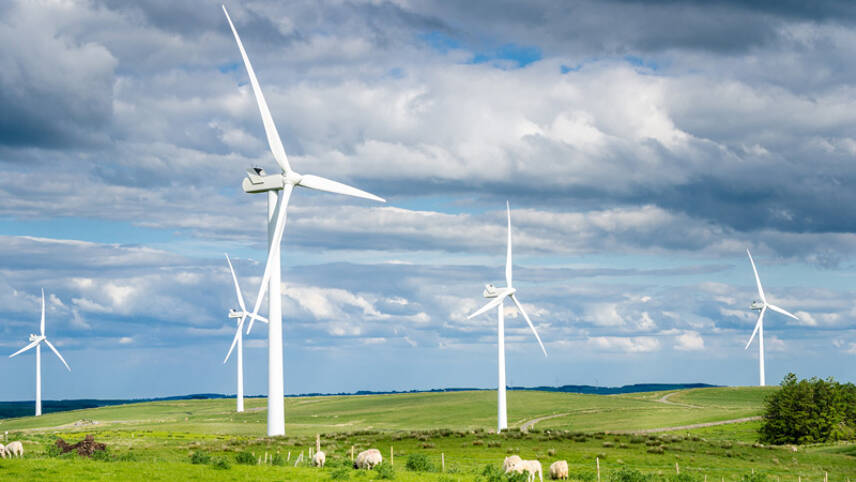Register for free and continue reading
Join our growing army of changemakers and get unlimited access to our premium content

Identified land could produce 2.5 times the electricity needed to power all households in England.
That is the warning to Chancellor Jeremy Hunt from five of the clean energy industry’s largest British trade bodies, collectively representing more than 750 organisations.
RenewableUK, Energy UK, Scottish Renewables, the Nuclear Industry Association and Solar Energy UK have written to the Chancellor ahead of his Budget next month, setting out the sector’s economic contribution to the UK economy and the extent to which this contribution could grow on the road to net-zero by 2050.
Their letter states that the sector invests some £13bn each year and returns some £30bn in gross value directly, plus a further £100bn in gross value through supply chains and partnerships. These figures should be far greater in the coming years as the UK works towards a 100% clean electricity mix by 2035 and towards its legally binding long-term climate targets.
The key warning is that this growth is not guaranteed, but, rather, dependent on coherent, joined-up and ambitious action from policymakers.
It states that, with the US and EU bringing forward major new subsidy packages and policy interventions to scale clean technologies in the coming years, “the UK can no longer take its competitive advantage as a mature market for granted”. The US’s Inflation Reduction Act, passed last year, offers $216bn worth of tax credits to clean energy and electric transport. The EU’s counter-measure, the Green Deal Industrial Plan, was set out broadly earlier this week, with meetings to flesh it out scheduled for this month and next.
The letter contrasts the moves made by the US and EU to interventions made in the UK that have proven unpopular in the clean energy sector recently. It highlights how, at the same time as imposing a windfall tax on profits, the UK Government launched a tax relief on investment for oil and gas firms. The level of relief has been scaled back but, as of yet, no relief has been applied to clean power generators.
In contrast, Whitehall has moved to impose a temporary revenue cap on low-carbon generators. The cap was introduced because, due to the coupling of gas and electricity prices, low-carbon generators stood to reap excessive profits in 2022, just as fossil fuel firms did. The cap has proven unpopular with renewable industry bodies, who argue that it is offputting to investors.
These moves have been compounded, the letter warns, by “ inflation, unfavourable exchange rates, and rising costs of raw materials and labour”. The economic challenges facing the UK at present, it states, are being acurely felt by the smaller developers and supply chain companies that were already seeing “very small margins” pre-2020.
Energy UK’s chief executive Emma Pinchbeck said: “The investment climate for UK low-carbon generation has worsened over recent months. Increased costs and renewed international competition risk squandering the UK’s lead as a clean technology pioneer.
“The Government must – at the very least – reform the capital allowances regime to keep investment and industry here in the UK; we need this low carbon infrastructure to power our economy cheaply and get bills down in the long run.”
Levelling up opportunity
The letter states that the Spring Budget is an opportunity to rectify these challenges and create a more attractive clean energy investment market in the UK. Hunt has notably stated that the Budget, due to be delivered in mid-March, will include measures to encourage innovation in cleantech and to address looming green skills gaps.
On Budget day, the letter’s signatories would like Hunt to confirm tax-free investment allowances for clean energy developers that “level the playing field” with fossil fuels. They are also calling for a reform of the sector’s capital allowance regime, enhancing allowances. The letter argues that this is a “tangible” step that would “do more to persuade investors than the promises of a future plan for economic growth”.
EY’s most recent global ranking of clean energy investment markets by their attractiveness placed the UK at fourth, down one place from the previous edition. The US and China held their top spots while Germany overtook the UK. EY stated that, while the UK made bold promises to scale offshore wind, Germany supports a broader range of renewables and had been even bolder.
The new letter emphasises how, by attracting clean energy investment, the UK can deliver on its levelling up commitments. It reminds the Chancellor that existing jobs are “in every corner of the country”, including “in the communities than need them most”. Losing these jobs would be a levelling up failure, while scaling these sectors presents new opportunities for skilled, well-paid jobs outside of London and the South East.
The letter recalls the levelling up sentiments made by MP Chris Skidmore in presenting the results of his landmark Net-Zero Review last month. The review was commissioned under Liz Truss, setting out measures to ensure the UK’s net-zero transition is “pro-business, pro-growth” and pro-levelling up.
“Any delay or shortfall in ambition will mean that our climate targets, and the economic opportunities they offer, will be increasingly hard to realise,” the letter concludes. “Time is against us and we cannot afford to get this wrong”.


Please login or Register to leave a comment.